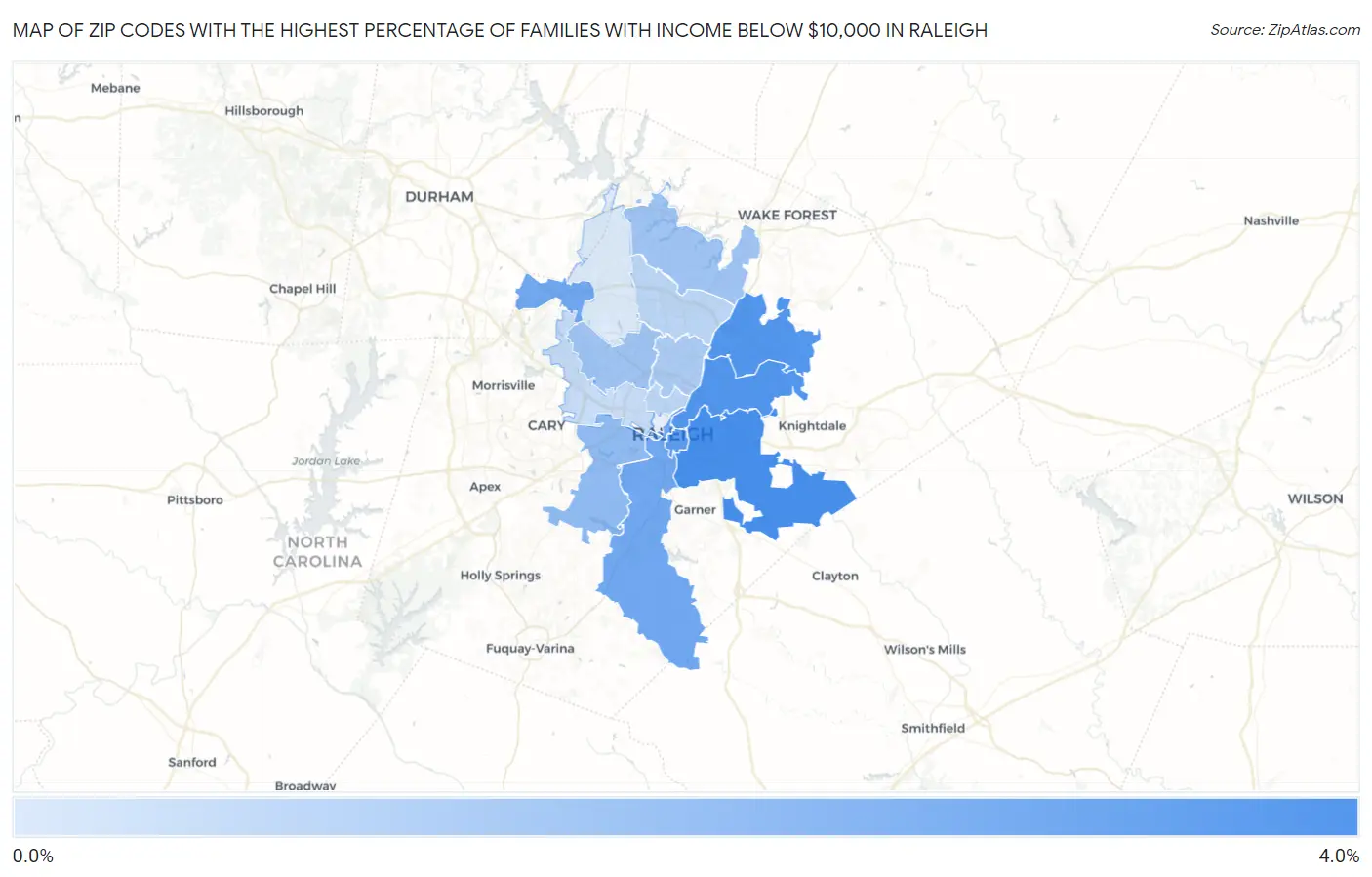Zip Codes with the Highest Percentage of Families with Income Below $10,000 in Raleigh, NC
RELATED REPORTS & OPTIONS
Family Income | $0-10k
Raleigh
Compare Zip Codes
Map of Zip Codes with the Highest Percentage of Families with Income Below $10,000 in Raleigh
0.30%
3.1%

Zip Codes with the Highest Percentage of Families with Income Below $10,000 in Raleigh, NC
| Zip Code | Families with Income < $10k | vs State | vs National | |
| 1. | 27610 | 3.1% | 3.3%(-0.200)#346 | 3.1%(=0.000)#10,738 |
| 2. | 27616 | 2.9% | 3.3%(-0.400)#363 | 3.1%(-0.200)#11,430 |
| 3. | 27604 | 2.9% | 3.3%(-0.400)#364 | 3.1%(-0.200)#11,443 |
| 4. | 27601 | 2.7% | 3.3%(-0.600)#391 | 3.1%(-0.400)#12,379 |
| 5. | 27603 | 2.3% | 3.3%(-1.00)#427 | 3.1%(-0.800)#13,872 |
| 6. | 27617 | 2.3% | 3.3%(-1.00)#430 | 3.1%(-0.800)#14,006 |
| 7. | 27606 | 1.7% | 3.3%(-1.60)#506 | 3.1%(-1.40)#16,702 |
| 8. | 27612 | 1.4% | 3.3%(-1.90)#542 | 3.1%(-1.70)#18,192 |
| 9. | 27614 | 1.4% | 3.3%(-1.90)#544 | 3.1%(-1.70)#18,218 |
| 10. | 27609 | 1.2% | 3.3%(-2.10)#562 | 3.1%(-1.90)#19,246 |
| 11. | 27615 | 0.90% | 3.3%(-2.40)#586 | 3.1%(-2.20)#20,714 |
| 12. | 27608 | 0.90% | 3.3%(-2.40)#590 | 3.1%(-2.20)#20,871 |
| 13. | 27607 | 0.70% | 3.3%(-2.60)#599 | 3.1%(-2.40)#21,702 |
| 14. | 27613 | 0.30% | 3.3%(-3.00)#639 | 3.1%(-2.80)#23,339 |
1
Common Questions
What are the Top 10 Zip Codes with the Highest Percentage of Families with Income Below $10,000 in Raleigh, NC?
Top 10 Zip Codes with the Highest Percentage of Families with Income Below $10,000 in Raleigh, NC are:
What zip code has the Highest Percentage of Families with Income Below $10,000 in Raleigh, NC?
27610 has the Highest Percentage of Families with Income Below $10,000 in Raleigh, NC with 3.1%.
What is the Percentage of Families with Income Below $10,000 in Raleigh, NC?
Percentage of Families with Income Below $10,000 in Raleigh is 2.2%.
What is the Percentage of Families with Income Below $10,000 in North Carolina?
Percentage of Families with Income Below $10,000 in North Carolina is 3.3%.
What is the Percentage of Families with Income Below $10,000 in the United States?
Percentage of Families with Income Below $10,000 in the United States is 3.1%.